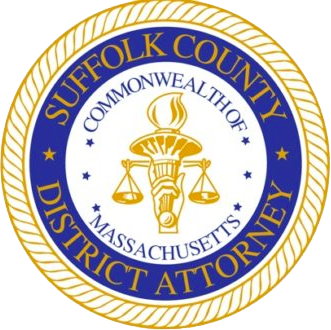District Attorney Rollins to Appeal Hinton Drug Cases to SJC for “Systemic Remedy”
BOSTON, Oct. 6, 2021 — District Attorney Rachael Rollins said today that she would appeal the decision of Superior Court Judge Michael D. Ricciuti refusing to send to the state’s Supreme Judicial Court a case to seek a global resolution of thousands of cases tainted by egregious misconduct and significant mismanagement and lapses of oversight of any kind at the William A. Hinton State Laboratory Institute.
As part of her Hinton Lab Initiative, DA Rollins has pledged to vacate Suffolk County drug convictions for any individual whose drug certification was completed at the severely mismanaged Jamaica Plain facility between May 2003 and August 2012. This is the entire period of time in which either now disgraced and convicted chemists Annie Dookhan or Sonja Farak worked at the facility, and up until it was ordered closed by Governor Deval Patrick due to abject failure of oversight at the lab. Yesterday’s filing is part of that effort.
Judge Ricciuti denied the Commonwealth’s request to report three questions regarding the Hinton Lab to the SJC that could result in a global resolution for the egregious misconduct and mismanagement.
The three questions the Commonwealth is asking the SJC to consider are:
Whether defendants whose convictions were supported by drug certifications created in the Hinton Lab with Sonja Farak as the primary or secondary chemist are entitled to the conclusive presumption of egregious government misconduct and thus should be granted new trials.
Whether defendants whose convictions were supported by drug certifications created in the Hinton Lab, regardless of the chemist that conducted the analyst, are entitled to the conclusive presumption of egregious government misconduct because the gross mismanagement of the Lab as identified by the Office of the Inspector General (OIG) in his 2014 report and thus should be granted new trials.
Whether the Commonwealth may address outbreaks of misconduct with global resolutions for a class of defendants impacted by identified misconduct, or whether Mass. R. Crim. P. 30 should be amended to allow for such global resolution?
In her filing from July, DA Rollins argued that a series of reported questions, “is the most direct and efficient way to address the need for global resolution and equitable justice for all of the defendants whose convictions were secured and rest on tainted Hinton Lab certifications. The full recognition of the huge impact of the wide-spread and systemic misconduct in the Hinton Lab can only be made at the appellate level.”
Without a systemic solution or global resolution, DA Rollins’ Hinton Lab Initiative would have to proceed on a one-by-one case basis to remove each epic governmental failure.
“Systemic problems require systemic solutions. Forcing individual parties impacted by egregious and extensive governmental misconduct to litigate just resolutions in approximately 70,000 separate cases - each infected with evidence generated at the Hinton Lab - is grossly inefficient, patently unfair, and demonstrably inequitable. It is beyond dispute that the vast majority of the defendants impacted by the Hinton Lab misconduct are people of color, specifically Black and brown men,” the July filing states.
In his decision, which also denied defendant Justino Escobar’s motion for a new trial (to which the Commonwealth assented), Judge Ricciuti said “the Commonwealth's petition is, in a word, premature.”
“How can something be premature when it is attempting to rectifying a harm that started nearly two decades ago and as recently as one decade ago? It is never premature to rectify government misconduct’’ said DA Rollins. “We need leadership that comes up with solutions for harm. When it is the government itself - the system – that causes the harm and engaged in the failure, it is even more important that we move swiftly and admit our mistakes. We will ask the SJC to review this matter so the egregious mismanagement at the Hinton lab will no longer taint and infect thousands of drug cases. Acknowledgement of the impact of the widespread misconduct at the Hinton Lab must be made at the appellate level. Judge Ricciuti’s decision allows us to raise it to the SJC.”
In all, chemists working at Hinton during the nine year period analyzed and certified some 82,800 samples from Suffolk County. More than 7,800 of those cases were already reviewed and vacated with prejudice as part of the Supreme Judicial Court’s 2017 ruling in Bridgeman and others v. District Attorney for the Suffolk District and others. But there are some 70,000 Suffolk County certifications that were not reviewed. It is those cases that will be the subject of the proposed global resolution. Since one certification can be used for multiple defendants or one defendant can have multiple certifications, the precise number of defendants impacted is still to be determined.
While the cases are all old, this still is an urgent matter because the collateral consequences of a criminal conviction can have life-long impacts on an individual’s capacity to gain employment, attend college, secure housing, and use government benefits, as well as many other opportunities. Prior convictions can result in longer sentences for an individual who may be found guilty in a subsequent offense.
The motion in Escobar was filed by Assistant District Attorney Donna Patalano, DA Rollins’s General Counsel, under the auspices of the Office’s Hinton Lab Initiative.
Suffolk County District Attorney Rachael Rollins’ office serves the communities of Boston, Chelsea, Revere, and Winthrop, Mass. The office handles some 20,000 cases a year. More than 160 attorneys in the office practice in nine district and municipal courts, Suffolk Superior Court, the Massachusetts Appeals Court, the Supreme Judicial Court, and the Boston Juvenile Courts. The office employs some 300 people and offers a wide range of services and programs to serve anyone who comes in contact with the criminal justice system. This office is committed to educating the public about the services we provide, our commitment to crime prevention, and our dedication to keeping the residents of Suffolk County safe.


